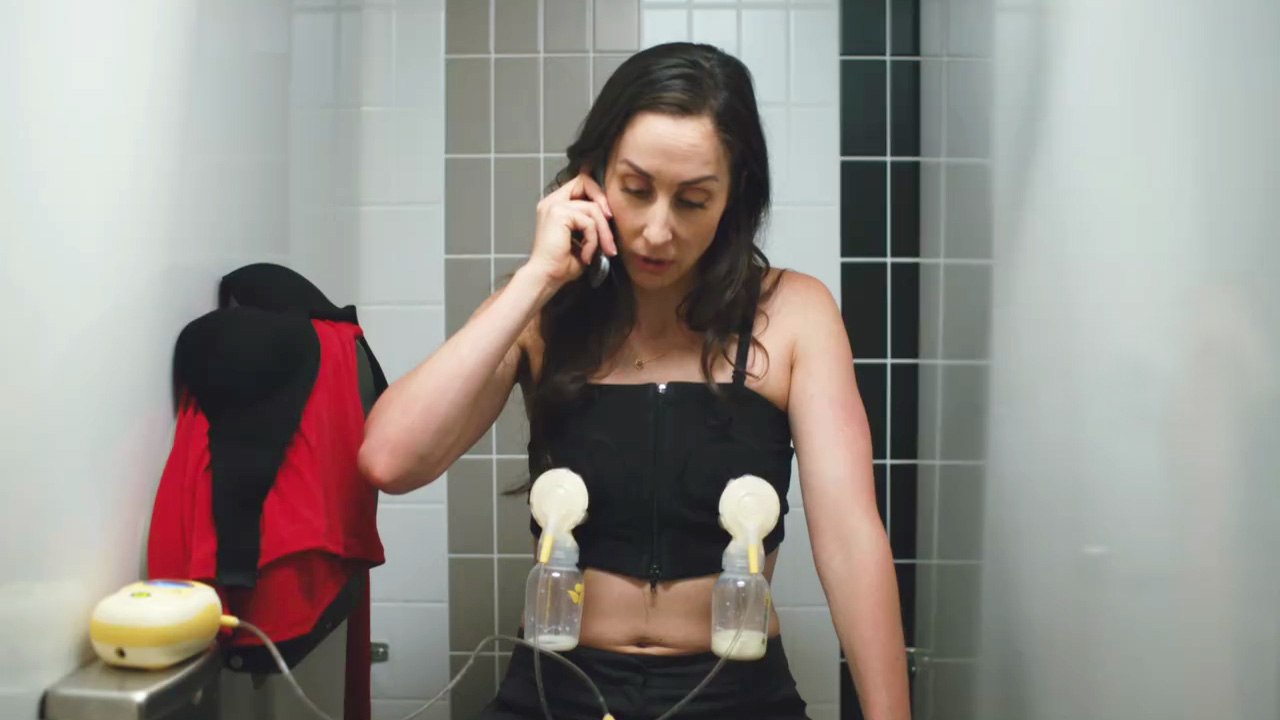Women have whisper networks. We talk about handsy colleagues and compare paychecks. We discuss skin care routines and pass book titles back and forth. I learned about Netflix’s latest import (from Canada no less!), Workin’ Moms, through my network and immediately passed it on.
You see, Workin’ Moms hasn’t gotten the press coverage of Russian Doll or You. It’s more in the One Day At A Time bucket, forced to grow its own audience through the luck of the algorithm, assumed to only speak to a niche audience (like Latinos — 16.7% of the population, or working mothers — 12%, le sigh). And so, we real working moms are spreading the show amongst ourselves, relaying the fact that this comedy gets to some of the truths of early motherhood in ways we haven’t seen before.
Usually, early motherhood is skipped over entirely (look at this cute baby, now skip forward until they’re old enough to lead their own storylines), glossed over as a sacred and precious period (babies are adorable yes, but difficult to care for too), or portrayed in slapstick comedy form (dirty diapers are perhaps not so hilarious when part of your daily routine). Not so with Workin’ Moms.It’s about the good and the bad, the hilarious and the heart-wrenching of early motherhood. There’s the scene about trying to get your baby to latch. The one where you finally have good sex after the birth. The one where you realize you’re pregnant again and think, I cannot do this.
I’m particularly impressed with how the show presents motherhood as an affront to your identity. All the moms on the show deal with it. In the first season (the one on Netflix now — Canada’s on season three), Jessalyn Wanlim’s Jenny Matthews rebels against the role of motherhood, reverting to her college-aged self, wearing chokers, piercing her nipple, and flirting/hooking up with inappropriate men (aka not her husband, aka her boss and random younger men). Juno Rinaldi’s Frankie Coyne faces the chemical imbalance of motherhood with postpartum depression, unable to keep her job, her sense of self, and sometimes her grip on reality. Dani Kind’s Anne Carlson struggles to match her gruff personality with mothering, feeling jealous of her nanny’s easy connection with her prepubescent daughter and contemplating an abortion of her third pregnancy. Meanwhile, our lead, Catherine Reitman’s Kate Foster hides her promotion from her husband, a career advancement that would be a no-brainer without kids. Now it’s fraught and painful, a no-win situation that turns Kate’s professional dream turned into a nightmare when her son winds up in the hospital.
Throughout, we see the specter of motherhood, this role that is supposed to fulfill you but requires never-ending self-sacrifice, as what it is: really fucking hard. Society’s depiction of motherhood in movies and in the media doesn’t fit actual women with actual lives. So many of us mourn the life we had before kids, the one that allowed us more leeway to focus on ourselves, to grow our careers and interests. The one that included late night outs and bodily autonomy. The moms on the show and the ones I know in real life all want the best for their kids and are willing to work hard and sacrifice for them. But what if we sacrifice too much? When does it become counterproductive? Maybe older kids can recognize that their parents have needs outside of them, but babies and toddlers cannot. Their needs are endless and can consume you if you don’t create boundaries. It’s a pretty tough line to draw, made more so by a social narrative that says you’re supposed to give endlessly and like it.
Not that motherhood is all bad nor is the struggle to navigate its demands. On Workin’ Moms, we see Anne finally bond with her daughter and when they connect it manages to be satisfying, meaningful, and funny. When Kate gets her baby to latch and then later decides to stop struggling and switch to formula, I felt her success in my bones (really my nipples) and the bittersweet compromise in my soul. Each woman is becoming better, yet different people through the journey of motherhood. This show honestly portrays the growing pains of this weird, rewarding, and difficult transformation that is early motherhood.
Workin’ Moms captures much of what it is to be a new mother but it is not perfect. All the moms are relatively affluent, either paying for nannies or able to have one of the parents stay home. The racial dynamics are rough, focusing mostly on the white experience. Early on Kate (white) fires her Filipino nanny in a scene that made me cringe — it othered the brown woman while allowing the power dynamics to go unquestioned. In the show’s mother circle, the lone black woman is consistently played for laughs, made strange and unrelatable for no discernible reason. Yes, the show features two women of color, Jenny and Frankie’s partner Giselle, but neither of them takes as central of a role as the white women.
And then there’s the stay-at-home mom in the mother’s circle who’s made the villain, Katherine Barrell’s Alicia Rutherford. She has precious ideas about self-sacrifice and women’s role in the home. And the other women bond over belittling her. After all these years of mommy wars, it would have been refreshing to see a show that doesn’t pit one type of motherhood against another. We’re not actually in conflict with each other. We’re in conflict with a society that tells us we should find fulfillment in unpaid, undervalued work no matter our personality or predilections. Workin’ Moms generally rallies against this notion as do the real working mothers I know. Here’s to the next two season arriving in the US, hopefully not repeating some of the more tone-deaf moments, and continuing to show motherhood for what it is: beautiful, impossible, real. That’s a story worth telling.

